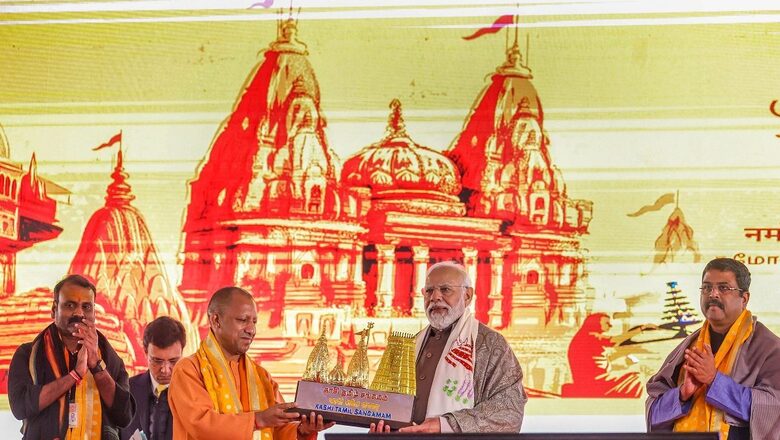
views
Ancient civilisations offer a glimpse into our past. From socio-politico-economic developments to ideologies, they remind us of the long journey that has shaped humanity—and our civilisations—into the modern society that we are today. In today’s world, we have an extraordinary opportunity to learn about other civilisations and witness their preserved grandeur firsthand, often just a plane ride away. In that regard, civilisation tourism is on the rise, particularly after the Covid-19 pandemic when nations finally reopened their borders, welcoming back tourists eager to explore the world after a nearly three-year hiatus.
That said, India, as a renowned, culturally rich nation, holds immense potential to tap into its tourism sector by leveraging its rich heritage and diverse offerings. Recognising tourism and hospitality as a fast-growing sector in India—contributing 1.77 per cent to the GDP in 2021-22, with expectations to reach revenues of $59 billion by 2028 and generate employment for 140 million by 2030—the Central government is paving the way to establish civilisational tourism as one of the country’s strongest tourism offerings.
Civilisational Tourism in the Modern World
Civilisational tourism plays a crucial role in conveying the history and culture of a country or region. From cultural practices and values to cuisines and socio-economic factors, approximately 40 per cent of tourists globally today travel to understand and learn about the culture of their destinations, allowing nations to imprint their civilisational values on travellers. Research also shows that creating a strong relationship between tourism and culture can help destinations become more attractive and more competitive as locations to live, visit, work, and invest in.
Germany is an exemplary case of a country that has successfully integrated its tourism with cultural heritage, vividly showcasing its extensive historical journey. From Checkpoint Charlie and the Berlin Wall to the Holocaust Memorial and the scattered ‘stumbling stones’—which commemorate Jewish victims of Nazism—Germany weaves a narrative that leaves a lasting impression on travellers. Simultaneously, the country’s modern architecture and vibrant lifestyle intrigue tourists on how a nation’s history has shaped its future and contributed to its emergence as one of Europe’s largest economies.
In this regard, India, too, has accelerated its efforts to develop a robust civilisational ethos for tourists visiting the country. For example, during its G20 presidency last year, the Ministry of Tourism promoted 2023 as the ‘Visit India’ year to increase our share of inbound tourists, as we intertwine tourism with our collective past, offering a glimpse into what binds us as a nation.
One of the most revered travel destinations for domestic and international tourists, Goa, a former Portuguese colony, illuminates its vibrant culture, Portuguese-style houses, fusion cuisine, and a plethora of churches. Leveraging its rich historical ties to elaborate on the unique liberation struggle and its subsequent integration into the Indian Union, Goa holds immense potential in bolstering our efforts to promote civilisational tourism and assist the coastal state’s push towards non-beach tourism, thereby creating global brand ambassadors who carry a far better understanding of India.
How We Can Leverage Civilisational Tourism
Civilisational tourism requires a thoughtful reflection on India’s soft power and the impression we want foreigners to take back to their home countries. While India’s ability to project its values abroad may be limited, foreign tourists arriving in India can be considered a captive audience. These tourists come with the expectation of experiencing India, presenting a unique opportunity to engage with them and turn them into cultural ambassadors. Civilisational tourism can thus help them understand not only India’s past but also what India is set to become in the future. It could help them understand the unique development of our civilisation, what our civilisation has uniquely contributed to human development, and what we can contribute to today’s world.
The Indian government has already undertaken several initiatives to advance civilisational tourism. One such initiative is the Kashi Tamil Sangamam, which aims to celebrate the common civilisational linkages between the geographically distinct regions of Varanasi and Tamil Nadu. The Cellular Jail in Port Blair is another example that enhances foreigners’ understanding of the brutalities of British colonisation. However, much more needs to be done to nurture these early efforts and create cultural narratives that resonate with foreign tourists.
These narratives can be tailored to specific destinations and audiences. For Southeast Asian tourists, the cultural narrative could focus on our centuries-old linkages and prospects for interlinked growth. Conversely, for Western tourists, cultural tourism might be centred around the concept of ‘new age spiritualism,’ which has gained immense popularity in the West and has its roots in India.
If implemented effectively, civilisational tourism could help India create global ambassadors for its culture in their home countries. Developing this concept and incorporating civilisational tourism into the National Tourism Strategy could be the first steps towards making this vision a reality. Civilisational tourism not only has the potential to enhance tourism but also to increase the perceived distinctiveness of our culture, paving the way for strengthening cross-cultural connections in the long run.
Omkar Sathe is a partner at CPC Analytics; Dr Sahil Deo is a co-founder of CPC Analytics. Views expressed in the above piece are personal and solely those of the author. They do not necessarily reflect News18’s views.













Comments
0 comment